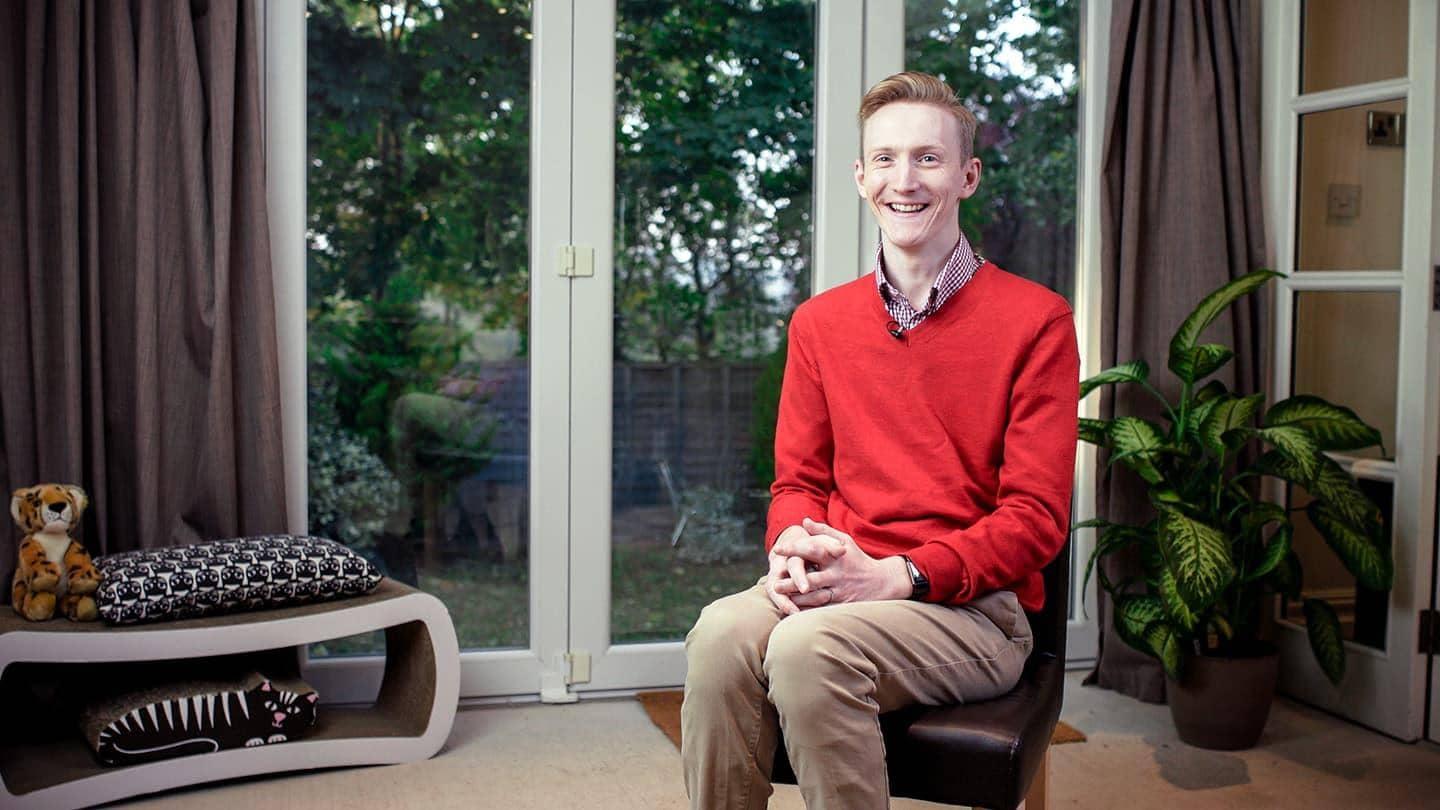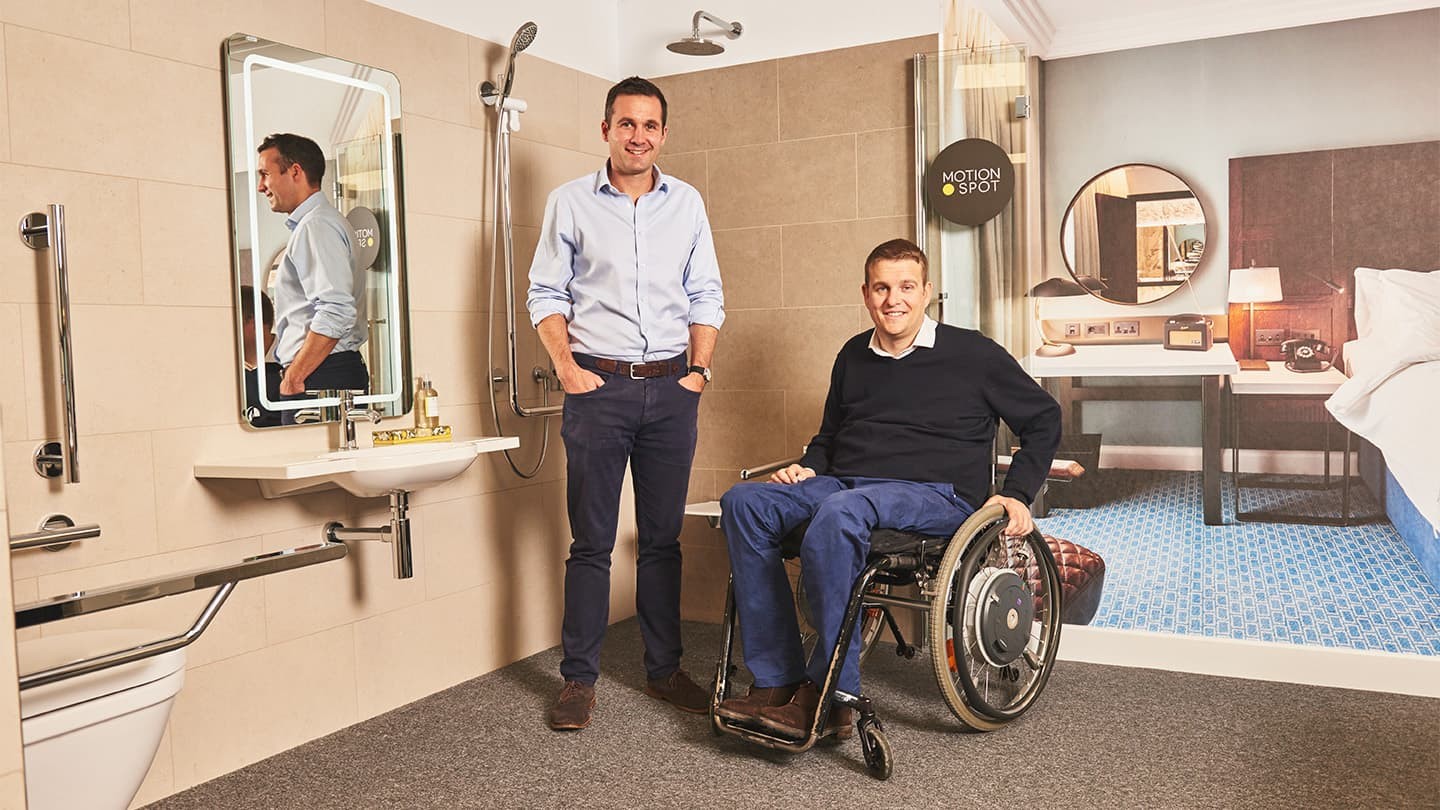
impact
Motionspot: beautifully accessible spaces for people with disabilities
Josh McDonagh has a neurological condition that makes it difficult to carry out everyday tasks such as getting dressed, eating and communicating. When adapting his new home, Josh was offered ‘medical-looking’ designs that made him feel as though he was in hospital. We talk to the architecture graduate about misconceptions surrounding people with disabilities and design, “overcoming barriers” – and how Barclays partner Motionspot helped him build a bathroom that was “truly beautiful”.
Josh McDonagh is a 26-year-old architecture graduate. He recently got married and this year moved into his first home in London. He also faces many challenges that others could only imagine. He was born with cerebral palsy spastic quadriplegia – a neurological condition which makes it difficult for him to move, speak and carry out basic day-to-day tasks.
“It’s quite a mouthful to say,” says Josh. “I guess one of the things I’ve found most difficult about my disability is time. Because everything takes me so much longer to do than the average person.”
Josh was always “very aware” of his disability, something he puts down to his parents discussing it with him at a young age. “I always knew I had limitations, there were things I couldn’t do. But where there was a barrier I would want to find a way to overcome that barrier.”
And he’s had many barriers to overcome. Attending a state school in a village just outside Bristol, he needed a lot of support – something that wasn’t always forthcoming. “In the end I got a lot of help, but my family had to really fight for it. I had to have someone write for me, help me read and generally just give me practical assistance.
“It wasn’t easy. I did face some bullying from other students – but the vast majority were sympathetic and caring.”
It’s to these challenges that Josh attributes his passion for architecture – a field in which he says he has a lot to offer because of his “unique perspective”.
“I’ve always been interested in how you design space, particularly given my insights into disability. I also think it’s really important for architects to think about future-proofing. We’ve got an ageing population. How are our buildings and spaces going to respond to that?”
"It felt like a hospital”
After graduating from Cardiff University, Josh moved to London with his now wife Richelle. Finding a property to rent threw up an all too familiar set of challenges, not just around accessibility but also around style. He needed to adapt his bathroom to cater for his specific needs but felt uninspired by the “hospital-looking” designs he was presented with.
“I wanted my bathroom to feel like a home and not feel ‘medical’,” he explains. “To me that was absolutely crucial, but every design I received felt so institutionalised with lots of white tiles and horrible looking floors.”
It was at this point that Josh was introduced to Motionspot – an accessible design company specialising in “empowering independent movement and creating beautiful enabling environments in one place”.
Motionspot was founded in 2012 by friends Ed Warner and James Taylor, after James broke his neck in a diving accident and returned from eight months in hospital to find his home heavily adapted to help him live independently.
In comments that echo Josh’s experience, James explains: “When I returned home after my accident there were several adjustments made by well-meaning but poorly informed occupational therapists and various others that had been round to assess how I was going to live my life.
“It felt like a hospital and that was something I really struggled with. Nobody wants to feel like that, especially if they are in their own home.”
With Ed’s help, James searched for an accessible design company that prioritised style as well substance – but found no one in the market offered such a service. Realising there must be others who shared James’ frustration, Motionspot was born.
Ed explains: “It was James’ experience that really opened my eyes to the world of disability and some of the challenges faced within the home. No company like Motionspot existed before 2012, and we wanted to blend beautiful design with function.”
The company has come quite a way since that lightbulb moment in 2012. Since conception, launching with only two employees, they’ve had to move offices twice to accommodate new recruits – and now boast a 15-strong team at their studio in Twickenham, south west London.
The company works with both individuals and big businesses to build bespoke, accessible and, most importantly, beautiful spaces for anyone with a disability.
“I’m really proud of the awards Motionspot has won over the last seven years,” says Ed. “And that’s a result of the clients and the testimonials that they have kindly given us and the strength of the team we have here.
“It’s the impact we have on the lives of our customers that really motivates us, and since starting we have positively impacted over 26,000 peoples’ lives.”
For Josh, it was Motionspot’s caring approach that resonated with him – they saw past his disability and built their products around his personality instead.
“Motionspot understand that yes I have a disability, but it doesn’t encompass who I am,” he explains. “A lot of companies say ‘you’re disabled so you must have this’. But Motionspot takes a completely different approach. They get to know you, they ask what you want and what you like – and then they tailor the service around that.
“They set the bar higher and delivered a wet room that is truly beautiful.”

Ed Warner and James Taylor, Motionspot Co-founders
“People who have disabilities are actually people first and foremost”
Initially, Barclays’ relationship with Motionspot didn’t come through a business partnership – but rather a recognition of shared passions such as accessibility and inclusivity.
Kathryn Townsend, Head of Customer and Client Accessibility at Barclays UK, explains: “I met Ed at an industry event and it was quite clear that our organisations shared the same values and passion around accessibility.
“We introduced Ed and the Motionspot team to some of our other contacts in this area who I knew would be interested in inclusive design and appreciate their forward-thinking approach.”
The meeting has led to an ongoing relationship that has benefited both companies, and their customers and clients.
Kathryn says: “Motionspot thinks differently about what is possible, achieving excellent results which enable independence without compromising on design. This makes their business quite unique, as disabled peoples’ needs are often neglected when it comes to fashion and interior design industries. And what’s even better is that Motionspot’s business is thriving, which reinforces the fact that aspirations for good design and quality do not disappear when someone is disabled. I hope that more companies wake up to the commercial opportunity of the ‘Purple Pound’ and realise that catering to the needs of disabled people isn’t just the right thing to do, it makes good business sense too.”
Motionspot took their banking to Barclays, and the bank has asked Motionspot to help design its flagship Glasgow Buchanan Wharf campus.
“We’re building our new campus from the ground up,” explains Kathryn. “So it’s a great opportunity for us to think differently about inclusive design from the start.”
For Josh, that early stage thinking about accessibility, married with style and design, is a welcome change to the approach he is so used to.
He explains: “There’s an opinion that people with disabilities don’t care about style and I think that’s totally wrong. The entire market of disabled or adaptive products needs to move to recognise that people who have disabilities are actually people first and foremost.”